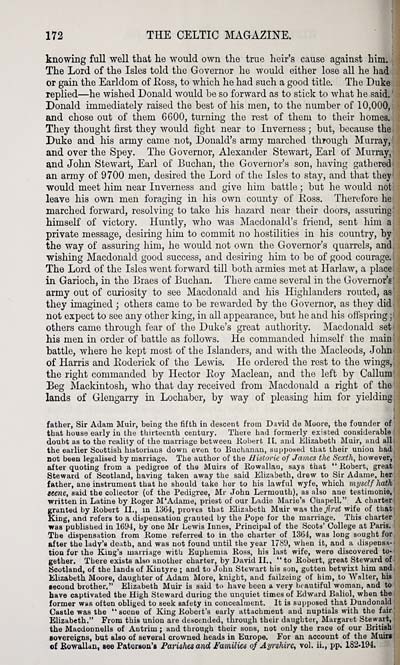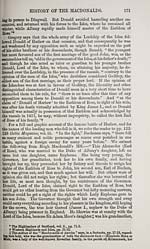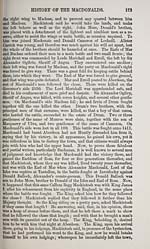Blair Collection > Celtic magazine > Volume 5
(182)
Download files
Complete book:
Individual page:
Thumbnail gallery: Grid view | List view

172 THE CELTIC MAGAZINE.
knowing full well that lie would own the true heir's cause against him. i i
The Lord of the Isles told the Governor he would either lose all he had ^ r
or gain the Earldom of Eoss, to which he had such a good title. The Duke :i
replied — he wished Donald would he so forward as to stick to what he said. ' ,'
Donald immediately raised the hest of his men, to the number of 1 0,000, i h
and chose out of them 6600, turning the rest of them to their homes, t
They thought first they would fight near to Inverness ; but, because thei f
Duke and his army came not, Donald's army marched through Murray, ! ;'
and over the Spey. The Governor, Alexander Stewart^ Earl of Murray,' i
and John Stewart, Earl of Buchan, the Governor's son, having gatheredi ■
an army of 9700 men, desired the Lord of the Isles to stay, and that they! I
would meet him near Inverness and give him battle ; but he would not i i
leave his own men foraging in his own county of Eoss. Therefore he; ;
marched forward, resolving to take his hazard near their doors, assuring! ij
himself of victory. Huntly, who was Macdonald's friend, sent him aj i
private message, desiring him to commit no hostilities in his country, by; ;
the way of assuring him, he would not own the Governor's quarrels, andj i
wishing Macdonald good success, and desiring him to be of good courage, j ,i
The Lord of the Isles went forward till both armies met at Harlaw, a place! i
in Garioch, in the Braes of Buchan. There came several in the Governor's! i
army out of curiosity to see Macdonald and his Highlanders routed, as; |
they imagined ; others came to be rewarded by the Governor, as they did| f;
not expect to see any other king, in all appearance, but he and his offspring jj i!
others came through fear of the Duke's great authority. Macdonald seti i
his men in order of battle as follows. He commanded himself the mainH
battle, where he kept most of the Islanders, and with the Macleods, Johnj i
of Harris and Eoderick of the Lewis. He ordered the rest to the wings,! i
the right commanded by Hector Eoy Maclean, and the left by Galium! i
Beg Mackintosh, who that day received from Macdonald a right of the^ i
lands of Glengarry in Lochaber, by way of pleasing him for yielding] i
father, Sir Adam Muir, being the fifth in descent from David de Moore, the founder of j i
that house early in the thirtetiith century. There had formerly existed considerable j t
doubt as to the reality of the marriage between Robert II. and Elizabeth Muir, and all( .
the earlier Scottish historians down even to Buchanan, supposed that their union hadj I
not been legalised by marriage. The author of the Bistorie of James the Sexth, however,] <
after quoting from a pedigree of the Muirs of Kowallao, says that " Kobert, great, '
Steward of Scotland, having taken away the said Elizabeth, drew to Sir Adame, herj i
father, ane instrument that he should take her to his lawful wyfe, which myself hath] •■
scene, said the collector (of the Pedigree, Mr John Lermouth), as also ane testiraonie.I i
written in Latine by Roger M'Adame, priest of our Ladie Marie's Cliapell." A charterj :
granted by Robert II., in 1364, proves that Elizabeth Muir was the j^rsi wife of that] i
King, and refers to a dispensation granted by the Pope for the marriage. This charter ^ i
was published in 1694, by one Mr Lewis Junes, Principal of the Scots' College at Paris, i i
The dispensation from Rome referred to in the charter of 1364, was long sought for j
after the lady's deiith, and was not found until the year 1789, when it, and a dispensa-j <
tioB for the King's marriage with Euphemia Ross, his last wife, were discovered to-j
gether. There exists also another charter, by David II., "to Robert, great Steward of! '
Scotland, of the lands of Kiutyre ; and to John Stewart his son, gotten betwixt him andi i
Elizabeth Moore, daughter of Adam More, knight, and failzeing of him, to Walter, his \
Becond brother." Elizabeth Muir is said to have been a very beautiful woman, and to ' I
have captivated the High Steward during the unquiet times of Edward Baliol, when thei
former was often obliged to seek safety in concealment. It is supposed that Dundonaldj i
Castle was the "scene of King Robert's early attachment and nuptials with the fair, ;
Elizabeth." From this union are descended, through their daughter, Margaret Stewart, i i
the Macdonnells of Antrim ; and through their sons, not only the race of our British] I
Bovereigns, but also of several crowned heads in Europe. For an account of the Muirs j i
of Bowallan, gee Paterson'g Parishes and Families of Ayrshire, vol. ii., pp. 182-194. !
knowing full well that lie would own the true heir's cause against him. i i
The Lord of the Isles told the Governor he would either lose all he had ^ r
or gain the Earldom of Eoss, to which he had such a good title. The Duke :i
replied — he wished Donald would he so forward as to stick to what he said. ' ,'
Donald immediately raised the hest of his men, to the number of 1 0,000, i h
and chose out of them 6600, turning the rest of them to their homes, t
They thought first they would fight near to Inverness ; but, because thei f
Duke and his army came not, Donald's army marched through Murray, ! ;'
and over the Spey. The Governor, Alexander Stewart^ Earl of Murray,' i
and John Stewart, Earl of Buchan, the Governor's son, having gatheredi ■
an army of 9700 men, desired the Lord of the Isles to stay, and that they! I
would meet him near Inverness and give him battle ; but he would not i i
leave his own men foraging in his own county of Eoss. Therefore he; ;
marched forward, resolving to take his hazard near their doors, assuring! ij
himself of victory. Huntly, who was Macdonald's friend, sent him aj i
private message, desiring him to commit no hostilities in his country, by; ;
the way of assuring him, he would not own the Governor's quarrels, andj i
wishing Macdonald good success, and desiring him to be of good courage, j ,i
The Lord of the Isles went forward till both armies met at Harlaw, a place! i
in Garioch, in the Braes of Buchan. There came several in the Governor's! i
army out of curiosity to see Macdonald and his Highlanders routed, as; |
they imagined ; others came to be rewarded by the Governor, as they did| f;
not expect to see any other king, in all appearance, but he and his offspring jj i!
others came through fear of the Duke's great authority. Macdonald seti i
his men in order of battle as follows. He commanded himself the mainH
battle, where he kept most of the Islanders, and with the Macleods, Johnj i
of Harris and Eoderick of the Lewis. He ordered the rest to the wings,! i
the right commanded by Hector Eoy Maclean, and the left by Galium! i
Beg Mackintosh, who that day received from Macdonald a right of the^ i
lands of Glengarry in Lochaber, by way of pleasing him for yielding] i
father, Sir Adam Muir, being the fifth in descent from David de Moore, the founder of j i
that house early in the thirtetiith century. There had formerly existed considerable j t
doubt as to the reality of the marriage between Robert II. and Elizabeth Muir, and all( .
the earlier Scottish historians down even to Buchanan, supposed that their union hadj I
not been legalised by marriage. The author of the Bistorie of James the Sexth, however,] <
after quoting from a pedigree of the Muirs of Kowallao, says that " Kobert, great, '
Steward of Scotland, having taken away the said Elizabeth, drew to Sir Adame, herj i
father, ane instrument that he should take her to his lawful wyfe, which myself hath] •■
scene, said the collector (of the Pedigree, Mr John Lermouth), as also ane testiraonie.I i
written in Latine by Roger M'Adame, priest of our Ladie Marie's Cliapell." A charterj :
granted by Robert II., in 1364, proves that Elizabeth Muir was the j^rsi wife of that] i
King, and refers to a dispensation granted by the Pope for the marriage. This charter ^ i
was published in 1694, by one Mr Lewis Junes, Principal of the Scots' College at Paris, i i
The dispensation from Rome referred to in the charter of 1364, was long sought for j
after the lady's deiith, and was not found until the year 1789, when it, and a dispensa-j <
tioB for the King's marriage with Euphemia Ross, his last wife, were discovered to-j
gether. There exists also another charter, by David II., "to Robert, great Steward of! '
Scotland, of the lands of Kiutyre ; and to John Stewart his son, gotten betwixt him andi i
Elizabeth Moore, daughter of Adam More, knight, and failzeing of him, to Walter, his \
Becond brother." Elizabeth Muir is said to have been a very beautiful woman, and to ' I
have captivated the High Steward during the unquiet times of Edward Baliol, when thei
former was often obliged to seek safety in concealment. It is supposed that Dundonaldj i
Castle was the "scene of King Robert's early attachment and nuptials with the fair, ;
Elizabeth." From this union are descended, through their daughter, Margaret Stewart, i i
the Macdonnells of Antrim ; and through their sons, not only the race of our British] I
Bovereigns, but also of several crowned heads in Europe. For an account of the Muirs j i
of Bowallan, gee Paterson'g Parishes and Families of Ayrshire, vol. ii., pp. 182-194. !
Set display mode to: Large image | Transcription
Images and transcriptions on this page, including medium image downloads, may be used under the Creative Commons Attribution 4.0 International Licence unless otherwise stated. ![]()
| Early Gaelic Book Collections > Blair Collection > Celtic magazine > Volume 5 > (182) |
|---|
| Permanent URL | https://digital.nls.uk/76451054 |
|---|
| Description | Volume V, 1880. |
|---|---|
| Shelfmark | Blair.6 |
| Attribution and copyright: |
|
| Description | A selection of books from a collection of more than 500 titles, mostly on religious and literary topics. Also includes some material dealing with other Celtic languages and societies. Collection created towards the end of the 19th century by Lady Evelyn Stewart Murray. |
|---|
| Description | Selected items from five 'Special and Named Printed Collections'. Includes books in Gaelic and other Celtic languages, works about the Gaels, their languages, literature, culture and history. |
|---|

